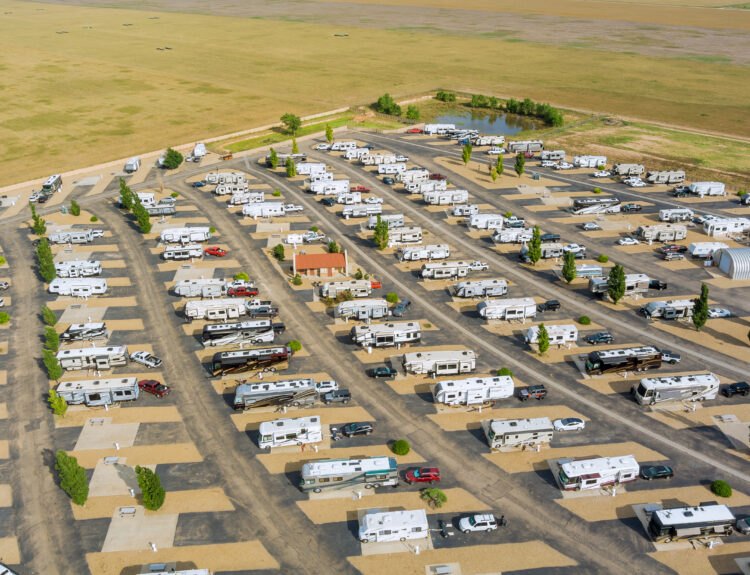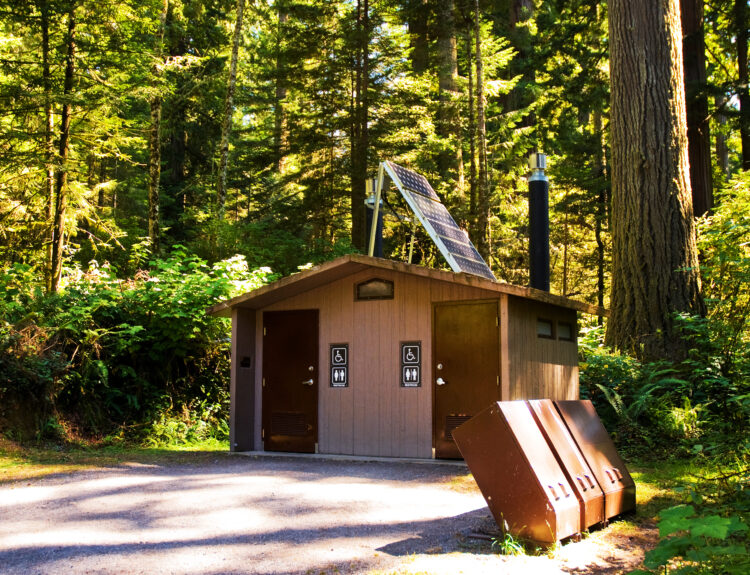In recent years, the allure of the open road and the comforts of home have found a harmonious union in recreational vehicles. As more individuals, families, and retirees seek experiences over material possessions, the RV lifestyle has seen a notable uptick.
Rather than an indicative of a temporary trend, this surge in popularity is a testament to a societal shift. And it brings along a golden investment opportunity – RV parks. Much more than just places to park and power up, modern RV parks offer communities, amenities, and experiences that RV enthusiasts are eagerly seeking.
This article will guide you into the multifaceted world of RV park investing, exploring its potential, understanding its business model, and offering key insights for prospective investors. Whether you’re a seasoned real estate investor looking for a diversification avenue or an enthusiast seeing potential in your passion, this can be your roadmap to RV park success.
Why RV Park Investing is Worth Your Attention
The open road, serene landscapes, the freedom to explore at one’s own pace—these are the visions that come to mind when one thinks of the RV lifestyle.
However, for the astute investor, this imagery also carries signs of an opportunity too significant to ignore. Delving into the reasons why RV park investing is garnering attention can offer insights into its lucrative potential.
Growing RV Popularity
It’s impossible to discuss RV park investment without acknowledging the astonishing growth in RV sales and ownership. North America has witnessed a significant rise in RV enthusiasts. While the recreational vehicle market size is 18.36 billion dollars in 2023, it is expected to reach 26.96 billion in 2028, with a CAGR of 7,99%.
The reasons are multifold: an increasing number of retirees embracing the nomadic lifestyle, families seeking budget-friendly vacations, and individuals aiming for flexible living and working arrangements. RV parks, thus, are no longer just stopovers but essential destinations catering to these diverse demographics.
Rising Travel Trends Favoring RVs
In addition to the broader RV boom, travel trends themselves have evolved in ways favorable to RV parks. The recent global events have led to a paradigm shift in how people vacation. International trips and congested tourist spots are being swapped for localized, nature-centric holidays.
According to a report by Statista, the camping industry in North America generated about $21.9 billion in revenue in 2022, a figure that is expected to grow consistently in the upcoming years.
RVs offer a unique blend of isolation and exploration, making them the vehicle of choice for many. RV parks, situated in picturesque locales away from the urban hustle, become the perfect sanctuaries for these modern travelers.
Industry Growth
Beyond RV sales and changing travel trends, the campground industry itself is on an upward trajectory. With an increasing number of campgrounds offering luxury amenities like Wi-Fi, spa services, and gourmet dining, they’re shedding their rustic image.
Today, RV parks are transitioning into resort-like destinations catering to both the traditional camper and the luxury-seeking traveler.
The convergence of these factors makes RV park investing a tantalizing prospect. The changing travel norms, coupled with the rising RV ownership and the transformation of the camping industry, create a perfect storm for investors. Those willing to tap into this market, with due diligence and strategic planning, stand to benefit from this flourishing industry.
Understanding the RV Park Business Model
Venturing into RV park investing requires more than just an appreciation for the open road. An in-depth understanding of the business model, its revenue streams, and operating costs is crucial for turning a plot of land into a lucrative venture.
So let’s dive into the mechanics of the RV park business model to equip investors with the knowledge they need.
Revenue Streams in RV Parks
- Rentals: This is the most straightforward source of revenue. RV owners pay for the space they rent, typically on a nightly, weekly, or monthly basis. Rates can vary depending on location, amenities, and the type of slot (e.g., pull-through vs. back-in).
- Amenities: Modern RV parks go beyond offering just basic utilities. Additional amenities such as Wi-Fi, laundry facilities, propane refill stations, and bathhouses can be monetized. For those looking to offer a luxury experience, facilities like swimming pools, fitness centers, and even spas can significantly boost revenue.
- Special Events: Organizing events like barbecues, movie nights, or local tours can attract both residents and non-residents. These events, while fostering a sense of community, can be another source of income, especially if there’s an entry fee or associated costs.
- On-site Retail and Provisions: An on-site store that stocks essential supplies, souvenirs, and even local produce or crafts can generate additional income. For many RVers, the convenience of buying necessities without leaving the park is worth the slight markup.
- Affiliate Programs: Collaborating with local businesses, from restaurants to adventure sports providers, can earn the RV park commissions for referrals.
Operating Costs and Maintenance
- Land Maintenance: This is one of the most recurrent expenses. Keeping the grounds clean, mowing the grass, landscaping, and attending to general wear and tear are essential for attracting and retaining customers.
- Utilities: Offering utilities like electricity, water, sewage, and Wi-Fi incurs costs. While these are often covered in the rental fees, maintaining these services, especially in peak season, can add up.
- Staffing: Hiring companies and paying wages to staff, from front desk personnel to maintenance workers, is a significant operating cost.
- Amenities Upkeep: Any additional amenities, like pools, fitness centers, or community halls, have their maintenance costs. Regular cleaning, safety checks, and periodic upgrades are essential.
- Marketing and Promotion: While not a traditional maintenance cost, it’s crucial for parks, especially new ones, to invest in marketing. From maintaining an active online presence to distributing brochures in tourist centers, marketing costs can vary but are essential for business growth.
- Licenses and Permits: Depending on the location, RV parks might need specific licenses to operate. These might need periodic renewal and can incur costs.
- Insurance: Protecting the business from potential liabilities, natural disasters, or accidents is vital. Comprehensive insurance, while an added cost, is non-negotiable.
Savvy RV park investors can significantly lower their tax bills by leveraging various deductions. From claiming depreciation on infrastructure and improvements to deducting operational expenses such as utilities, staffing, and marketing, the tax code offers several avenues to offset income.
Strategically using these deductions helps investors not only reduce their taxable income but also free up more capital, bolstering the growth and expansion of their RV park business.
Understanding the balance between revenue and expenses is the cornerstone of running a successful RV park. While the revenue streams can be diverse, the associated costs require meticulous management.
Moreover, the RV park business model is dynamic. Trends change, guest expectations evolve, and economic climates shift. Staying updated, being adaptable, and continuously striving for excellence in service will set the foundation for a thriving RV park.
In essence, the RV park business model is a blend of real estate, hospitality, and community-building, all set against the backdrop of the great outdoors.
Key Steps to Successful RV Park Investing
Investing in an RV park can be a lucrative venture, but it’s not as simple as purchasing a plot of land and watching the profits roll in. It’s a multifaceted process that involves careful planning, strategic investment, and a commitment to the long-term success of your business. Here are some essential steps to guide you through a successful RV park investment journey.
Research and Location
Location is crucial for any real estate investment, but especially for RV parks, as it determines the demand, the competition, and the profitability of your business. Consider location as a make-or-break factor for the success of your RV park.
As in any investment journey, the first step involves thorough research.
- Market Research: Investigate the demand for RV parks in your target area. Are there other parks nearby? What are their occupancy rates, and what kinds of amenities do they offer?
- Demographics: Understanding the typical RV park user in your area can guide your marketing strategy and service offerings. Is your target market retirees, families, or adventure seekers?
- Local Regulations and Zoning: Before buying land or an existing park, familiarize yourself with zoning laws. Is the land zoned for an RV park? Are there any environmental restrictions?
- Accessibility and Visibility: Proximity to tourist attractions, ease of access, and visibility from main roads can also affect your park’s success.
- Climate: The climate and seasonality of the area, such as the average temperature, precipitation, snowfall, etc.
Acquisition or Development
After deciding on the location, you have two primary routes: acquiring an existing RV park or developing one from scratch.
- Buying an Existing Park: This option is often more straightforward as the infrastructure is already in place. However, due diligence is necessary. Investigate the park’s financial history, customer reviews, and compliance with regulations.
However, acquiring an existing park also has some drawbacks, such as the high cost of purchase, which might require a large amount of capital or financing, the potential for hidden problems, and the limited room for improvement, as the park might already be optimized or constrained by its current layout and features. - Starting from Scratch: Developing your park offers the advantage of customization. You can design your RV park to meet specific demands in the market. You can also benefit from lower operating costs, higher occupancy rates, and higher rent prices.
However, this route is often more time-consuming and fraught with regulatory hurdles. You will have to be ready to face the long and complex process of finding and acquiring land, obtaining permits and approvals, constructing and installing infrastructure and amenities, as well as the intense competition from other established or new parks in the area.
Enhancing the Customer Experience
Customer experience is crucial for any hospitality business, and RV parks are no exception. Satisfied customers are key to retaining loyal customers, attracting new customers, and increasing your revenue and value.
- Amenities: Offering amenities like free Wi-Fi, clean restrooms, and recreational facilities can attract a broader customer base.
- Community Building: Organize events, workshops, or group activities to create a sense of community. This not only enhances the customer experience but can also be an additional revenue stream.
- Safety and Cleanliness: Invest in security measures and maintain cleanliness to a high standard. Word of mouth is potent in the RV community, and a safe, clean park will garner favorable reviews.
Marketing and Promotion
Marketing is essential for any business, but especially for RV parks, as they rely on word-of-mouth and online exposure to attract customers. No matter how great your RV park is, it won’t succeed without effective marketing. Marketing and promoting your RV park is key to reaching more potential customers and increasing your occupancy rate.
- Website and SEO: An attractive, user-friendly website is essential. Use SEO strategies to rank higher on search engines. Make sure to use high-quality photos and offer online booking facilities.
- Social Media: Regular updates on platforms like Facebook, Instagram, and Twitter can keep your audience engaged. User-generated content, like posts from happy campers at your park, can be incredibly influential.
- Local Partnerships: Form alliances with local businesses and tourist boards to get referrals.
- Customer Reviews: Encourage satisfied customers to leave reviews on popular platforms. Address negative reviews professionally and use them as an opportunity for improvement.
RoverPass Premium Website Builder is a solution we created to help RV parks grow faster with high-quality, unique websites. We start with an SEO audit to rank your website well on Google, and then we move on to design, create, develop, and launch a customized website that showcases your park and attracts new customers.
Leveraging Technology

In this digital age, leveraging technology can give your RV park a competitive edge. Technology can help you save time, money, and resources, as well as improve your efficiency, accuracy, and productivity.
- Automated Booking: Use software that allows for online reservations and payments. It simplifies the process for you and the customer.
- Customer Relationship Management (CRM): Utilize CRM software to keep track of customer information, preferences, and feedback. This data can be crucial for tailoring services and promotions.
- Digital Marketing: Use digital tools to assess the effectiveness of your online marketing campaigns. Adjust strategies based on real data.
- Smart Amenities: Offering smart locks for facilities, app-controlled lighting, or even tech-enabled communal spaces can make your park stand out.
One of the most powerful digital tools to enhance management in the RV park industry is RoverPass campground reservation software. Designed to be the ultimate solution for reservation management in the industry, it will enable you to handle your bookings more effectively, accept payments more quickly, communicate better with your guests, and increase your revenue per site.
Maximizing Deductions for RV Park Businesses
Savvy RV park investors can significantly lower their tax bills by leveraging various deductions. From claiming depreciation on infrastructure and improvements, deducting operational expenses such as utilities, staffing, and marketing, to capitalizing on interest from loans taken for park development, the tax code offers several avenues to offset income.
By understanding and strategically using these deductions, investors not only reduce their taxable income but also free up more capital, bolstering the growth and expansion of their RV park business.
The steps to successful RV park investing are comprehensive but by no means insurmountable. The key lies in meticulous planning, a deep understanding of the market, and a relentless focus on customer experience. With these critical steps in hand, you’re well on your way to becoming a successful RV park investor, ready to tap into the untapped potential of this booming industry.
Risks and Challenges in RV Park Investing

While RV park investing offers immense potential for profitable returns, it’s crucial to be aware of the inherent risks and challenges that come with the territory. Knowing what you’re up against can help you prepare better and mitigate these risks effectively. Let’s delve into some of these challenges to equip you with a balanced perspective as you consider your investment.
Seasonality
- Understanding Seasonal Trends: One of the most obvious challenges for any RV park investor is the seasonality of the business. Depending on the location, the influx of guests can be highly dependent on the time of the year. While summer months may bring packed parks and soaring profits, winter could spell low occupancy rates.
- Mitigating Seasonality: Many parks turn to hosting events or offering off-season discounts to attract guests. However, some locations may have limited options to offset seasonality, and the revenue generated during peak months will need to sustain the business during slow periods.
Economic Factors
- Recession Sensitivity: Economic downturns can severely affect the disposable income of your potential customer base. While RV travel is often considered a budget-friendly, recession-proof vacation option, economic instability can still deter potential travelers.
- Fuel Prices: The cost of fuel is another economic factor that could influence your RV park business. Skyrocketing fuel prices can lead to a decrease in long-distance travel, affecting the number of guests at your park.
Maintenance and Upkeep
- Regular Expenses: While operating costs like utilities, staffing, and maintenance are par for the course in any business, they can be particularly high in the RV park business due to the vast areas of land and numerous facilities that must be managed.
- Unanticipated Costs: You should also prepare for unexpected costs like natural disasters, equipment breakdowns, or sudden necessary upgrades, which can disrupt cash flow.
Regulatory Challenges
- Zoning Laws: Before even purchasing land or an existing park, the hurdles of zoning laws and environmental restrictions can stymie development plans.
- License and Permit Costs: Acquiring the necessary licenses and permits isn’t just about paperwork; it can be costly and time-consuming, particularly if you encounter legal hurdles.
Market Saturation
- Competition: High demand for RV parks in a specific location can be a double-edged sword. While a popular area guarantees a stream of guests, it can also mean high competition, forcing you to continually innovate to stand out.
- Differentiation Challenges: Especially in saturated markets, being able to differentiate your RV park from competitors in meaningful ways can be difficult. Amenities and customer service become your calling card, but they require consistent investment.
Customer Behavior and Preferences
- Evolving Trends: Guest expectations and behaviors are not static. As travel trends change, RV parks must adapt by offering the facilities and services that modern travelers seek.
- Online Reputation: The digital age has made it easier for dissatisfied customers to voice their complaints publicly, affecting your RV park’s reputation. Therefore, managing online reviews and customer feedback is crucial.
Operational Risks
- Staffing: High turnover rates in seasonal staff can affect service quality while retaining full-time staff during off-peak seasons can be expensive.
- Amenity Maintenance: Additional amenities like swimming pools or fitness centers may attract more guests but also come with their own sets of operational challenges and costs.
Financing and Cash Flow
- Initial Investment: Developing an RV park requires a substantial upfront investment. Whether you’re purchasing land, existing structures, or both, it’s crucial to have a robust financing plan in place.
- Cash Flow Management: Managing cash flow effectively, especially during off-peak seasons, is crucial for sustainability. Many promising RV parks have gone under due to poor cash flow management.
Understanding the risks and challenges involved in RV park investing allows you to anticipate and prepare for them, ultimately making your business more resilient. By doing so, you can address these challenges head-on, armed with strategies to mitigate their impact.
While it’s crucial to focus on the potential for high returns in the RV park industry, a well-rounded, cautionary approach that acknowledges the challenges can serve as your roadmap to long-term success.
If you want to learn more about the challenges and opportunities in the RV park industry, keep reading our blog!






